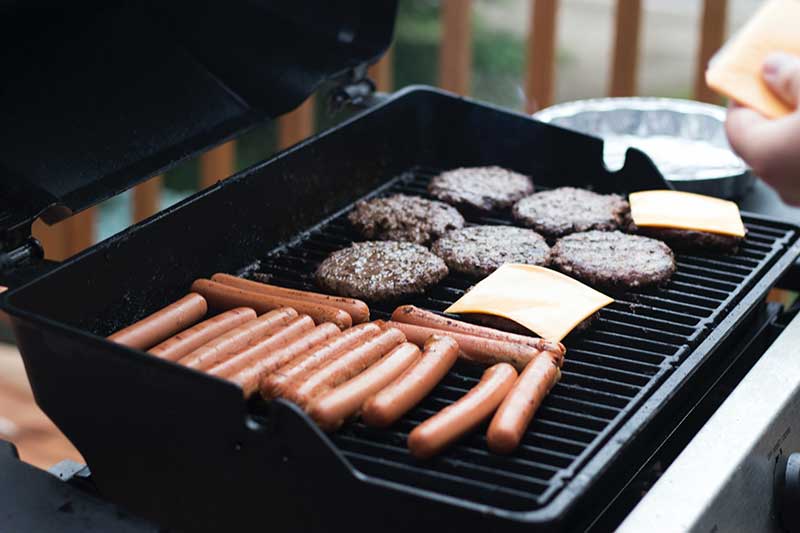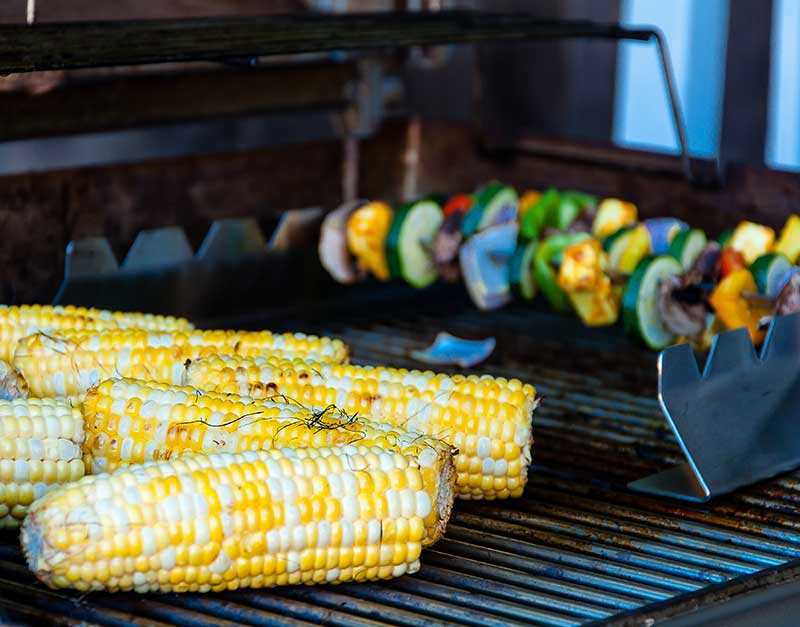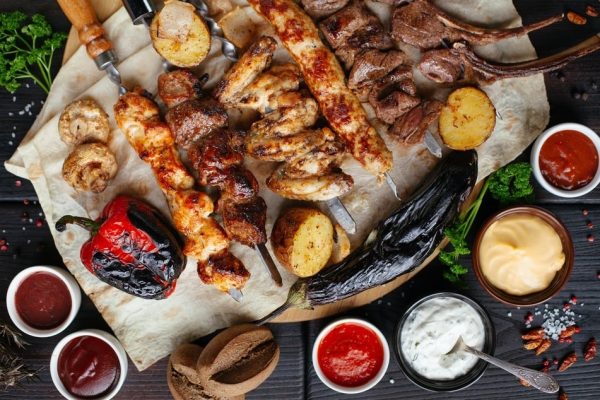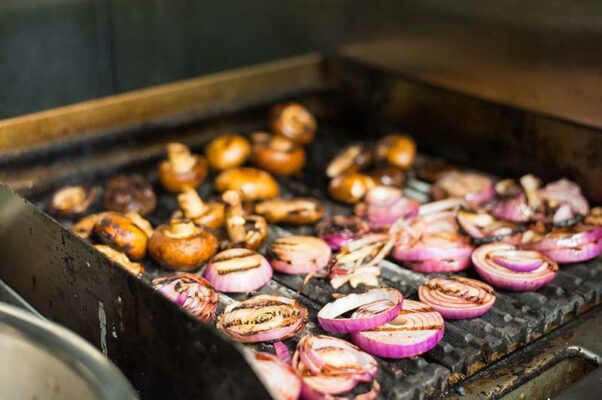The customer service team is always listening, taking notes, and quantifying complaints to ensure our products are continually improved. Due to selling directly to you, the customer, via Amazon, we can use product reviews to help us improve our existing products or help further development of new products.
Table of Contents
Grilling is a great pastime for many outdoor cooking enthusiasts, but informal celebrations often lead to carelessness. Gas grill safety rules are important for protecting you from devastating injuries that include overwhelming flames and gas explosions.
Potential Gas Grill Danger
Gas grill fire safety tends to involve more people than a single cook in the kitchen because everyone tends to gather around the grill, which includes excited children. Both propane and natural gas grills can be ticking time bombs if not carefully used and inspected for damage and leaks.
There are more than 7,000 gas grill fires each year, and gas explosions are common when a propane tank or line spring a leak. In an experiment, Today.com simulated a common type of gas leak – with firefighters standing by – and within a few minutes, a giant fireball exploded from the propane grill.
One of the most common safety issues is opening the gas valve, closing the lid and hitting the igniter, which can easily cause this kind of explosion from the buildup of gas.
Dos and Don’ts of Grill Safety
Gas grill safety tips include both fire safety and food safety best practices. You can pay careful attention to fire risks while ignoring food safety by letting the meat sit outside for too long. If the meat is not cooked to a safe temperature to kill bacteria, your whole group could contract food poisoning. The only accurate way to determine food temperatures is using an efficient thermometer, such as a ThermoPro Food Thermometer.
Planning food safety and gas grill safety doesn’t take a lot of time, but the benefits can be tremendous. It’s hard to prove a negative, but your diligence can prevent food poisoning, horrific fire accidents and even grill explosions. The best practices for grill safety include both dos and don’ts:
Things You Should Do
The following is a list of best practices when working with a gas grill:
- You should only attempt to light a grill outdoors in a well-ventilated area.
- Keep the grill controls turned off and the gas valve closed when not using the grill.
- Don’t cover the grill until it’s had time to cool off after use.
- Test the tank, gas lines and fittings for leaks before lighting the grill.
- Keep propane tanks stored in an upright, vertical position, and you might consider chaining the tank to an exterior wall for additional safety.
- You should take tanks of propane or natural gas home immediately after filling them and store them safely.
- Check tanks before having them refilled for dents, scratches, rust and leaks.
- Keep hose-end fittings and air intakes covered when the grill isn’t being used.

Things You Shouldn’t Do
Safety depends not only on the safety measures that you take but also on avoiding safety risks. Some of the things that you shouldn’t do with your grilling equipment include:
- Don’t store gas tanks – full or empty – indoors.
- Avoid smoking while handling the grill and gas tanks.
- Never leave the tank in a vehicle where heat can build up extensively.
- Don’t use a lighter or a match to check for leaks.
- Keep children away from the grill and gas tanks.
- Don’t store, use or transport tanks where they’re exposed to high heat or open flames, which includes not storing spare tanks under the grill.
Safe Tips During Cooking on Gas Grill
Propane and natural gas grill safety depend on careful operation, so you should save the alcohol to enjoy after you’ve used, cleaned and stored the grill safely. Grilling while impaired from alcohol is common, and inebriation can result in unsafe grill operation and delayed responses to fire risks. The following 10 safety tips can ensure safe, effective and expert grill operation:
- Set up your grill at least 10 feet from the house and other structures.
- Make sure there are no decorations, hanging baskets, sun umbrellas and other flammable materials near the grill.
- Keep a fire extinguisher nearby that’s rated for grill fires and within inspection limits, but call 911 first in an emergency.
- Keeping a spray bottle of water handy can control minor flare-ups without damaging your food.
- Cleaning your grill to reduce grease buildup is one of the strongest fire-prevention measures you can take, and your food will cook and taste better on a clean grill.
- Check for gas leaks before firing up the grill by covering fittings, hoses and connections with a half-and-half mixture of soapy water, and then turn on the gas to see if any soap bubbles appear to indicate leaks.
- Never use propane or natural gas beyond their expiration dates.
- Never store tanks indoors.
- Never cook on a grill indoors – no matter how small the grill – because of the risks of carbon monoxide poisoning.
- Don’t overload the grill or leave it unattended; grilling lots of meats increases the amount of grease, which leads to flare-ups, which is why it’s important to attend the grill at all times.

Grill Care and Maintenance
Grills vary in the way they’re engineered, so you should always follow the grill-specific instructions of the manufacturer of your gas grill. However, there are some general care and maintenance tips that will not only ensure safety but also improve the flavor of the food and the efficiency of the grilling process. Some of the top maintenance tips include:
- Check all hoses, tanks and connections for leaks before turning on the grill.
- Clean the grill trap after each use.
- Clean the grill thoroughly after every two or three grilling sessions.
- Check the tubes to the burners and the burner assemblies for blockages, which you can clean with pipe cleaners or wires.
- Inspect the grill for foreign materials, such as bird or insect nests.
- Get professional help – if your tanks need repair – from a propane dealer or qualified appliance repair technician.
- Replace tanks that are old, rusty or dented badly.
- Overcooking food can increase the possibility of a grill fire, so you should always use a meat thermometer to gauge doneness.
- Clean the cooking grates regularly; there’s a big difference between the taste of fresh caramelization and burnt food particles.
- You can cover your grill for outside storage with a vinyl cover; if storing the grill indoors, disconnect the gas tank to store outdoors.
- You can wash your gas grill with warm, soapy water and a long-handled, stiff brush; cover the gas valves and connections with foil before cleaning.
- Remove the burner protectors and wash them separately.
Food and Grill Safety
It’s important to consider both food and grill safety when planning outdoor events or firing up the grill spontaneously. That’s why it’s best to keep your grill clean and maintained so that it’s ready for grilling anytime the mood strikes. Food safety depends on keeping food hot or cold to prevent bacteria growth. That means not bringing out food for an hour or more before you’re ready to grill.
Cooking to a proper temperature kills foodborne pathogens, and the only way to guarantee you’ve reached the right temperature is to use a food thermometer. Unfortunately, some thermometers create their own safety risks, such as burnt-out probes and accidents caused by inserting instant-read thermometers over a hot grill.
Using a high-quality probe thermometer or wireless meat thermometer such as ThermoPro is a good investment for grill aficionados who want to do a safe, professional job.
According to USDA.gov, it’s important to prevent cross-contamination by keeping all utensils and food surfaces clean and separating raw and cooked foods. You should cook food to the minimum safe temperature for the type of food, which ranges from 140-degrees Fahrenheit to 165-degrees Fahrenheit. That applies to grill, smoking, pit cooking and reheating leftovers.
Gas Grill Safety Rules Create Memorable Occasions
Following grill safety practices can ensure that you have a safe and memorable grilling event, instead of a nightmare scenario where someone is seriously injured. Using the right thermometer on your gas grill is also important to food quality and safety from food pathogens. Grilling involves using intense heat to caramelize food and create complex flavors. Despite assurances from some cooks that they can always judge the proper degree of doneness, using the right thermometer is the only way to be certain.









